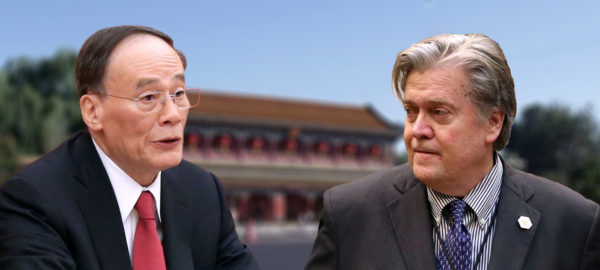Wang Qishan, the Chinese Communist Party’s anti-corruption chief, has recently been busy meeting high-profile foreign guests.
Steve Bannon, President Donald Trump’s former chief strategist and Breitbart head, flew to Beijing from Hong Kong for a private meeting with Wang, according to the Financial Times (FT). The meeting took place after Bannon’s Sept. 12 talk at an investor conference in Hong Kong.
Wang, who FT reported was interested in what Bannon had to say about “economic nationalism and populist movements,” went through an intermediary to arrange the 90-minute tête-à-tête at the Chinese leadership headquarters of Zhongnanhai. A person familiar with the matter told FT that the meeting wasn’t connected to Trump’s upcoming trip to China.
Meanwhile, Singapore leader Lee Hsien Loong requested and secured an audience with Wang on Sept. 22. Lee and other Singapore ministers were in China for a three-day visit. Wang said he was surprised but happy at Lee’s request, and had “sought permission,” presumably from Chinese leader Xi Jinping, before agreeing to meet the Singaporean prime minister and his delegation.
Why it matters: Singapore and the United States probably want to know the progress and future of Xi’s anti-corruption campaign that has been shaking up China politically and economically, and there is no better way to find out than going directly to have a talk with the head of the campaign.
There is also much speculation in recent months as to whether Xi will grant Wang another five-year term in top office. Officially, Wang (69) is past the retirement age (68) for elite Party cadres, so Xi will have to either change the norm or find special reasons to keep Wang around Zhongnanhai. Foreign news outlets have also been carrying rumors that Wang plans to retire or is suffering from terminal illness—the latter rumor appears to be untrue as Wang looked hale and healthy in recent public appearances.
Our take on Wang: SinoInsider believes that Xi Jinping still needs Wang Qishan to drive the anti-corruption campaign after the Oct. 18 congress, which has been instrumental in taking out Xi’s political rival, the Jiang Zemin faction. Without Wang applying pressure, the Jiang faction could mount a comeback and seriously impede Xi from carrying out his policies over the next five years.
Xi allowing and publicizing Wang’s meeting with Lee Hsien Loong and Steve Bannon is further indication (see our Sept. 8 article) that Wang is in very good political standing.
Based on our analysis, we believe that Wang stands a very high chance of securing a top leadership position and will retain his anti-corruption portfolio.
If Xi implements a Chairman system at the Congress, Wang could become Party vice chairman (or Chinese vice president by former translation), and appointed director of the National Supervisory Commission (a new state anti-corruption body) and continue to head the Central Commission for Discipline Inspection.
If Xi retains the Politburo Standing Committee system, then Wang should stay a Standing Committee member plus the other offices mentioned above.
Xi might make other arrangements, but we believe that he will almost certainly place Wang in charge of the National Supervisory Commission.
Contact us for the in-depth analysis on Wang Qishan












